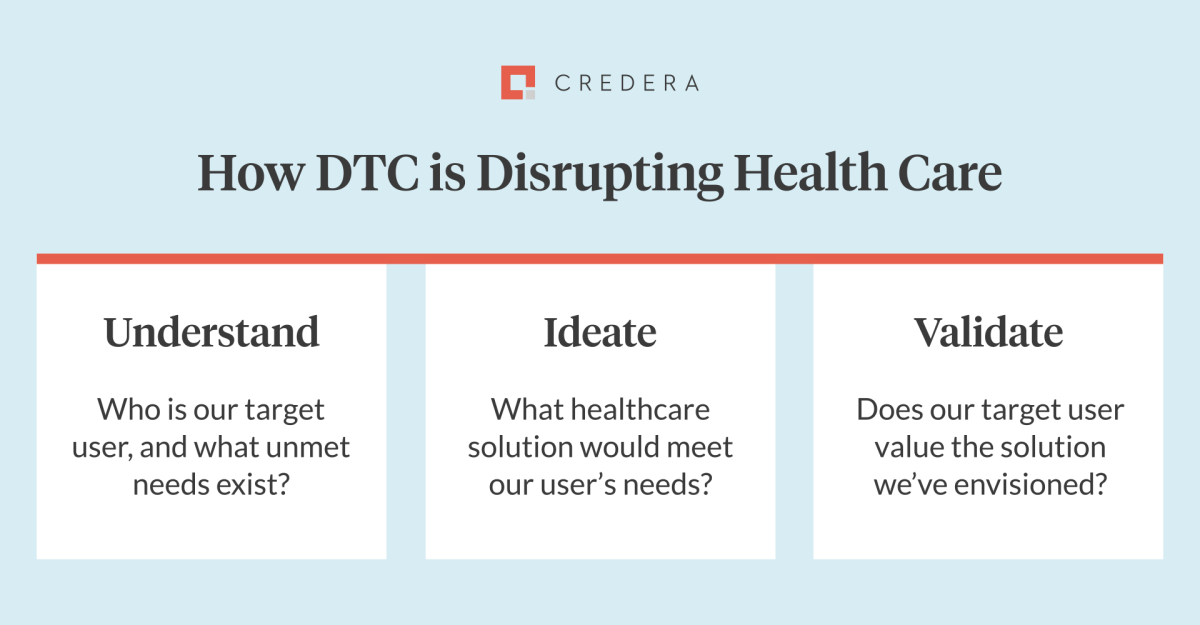
The health care industry is beyond ready for disruption. In fact, it’s already in the beginning stages of a rapid and monumental shift.
DTC and the Future of Health Care
Picture this: A notification on your phone wakes you up, giving you the exact combination of vitamins to take that morning. This combination is specific to your DNA and genealogy, your sleep the night before, and what you ate yesterday. You send that combination to your 3D printer and it prints out your pills for the day. Based on data collected about you, notifications pop up throughout the day advising what meals you should eat, how much water to drink, and the workout you need (already preloaded on your Peloton bike). You’re warned if you’re about to be at risk for a heart attack or if your blood pressure is too high, and then you get the recommended preventative actions. Every choice is centered on overall wellness, not just symptom management.
Let’s assume you’re older or immobile and have a health emergency. Your app automatically notifies a mobile clinic and the facility comes to your home to avoid an expensive and lengthy trip to the hospital. You see the doctor virtually, she checks your vital signs and health history from the data collected over the years, then prescribes the services you need.
Or perhaps you live in a developing country, where the health care system hasn’t yet matured. Through advancements in artificial intelligence (AI) and machine learning (ML), you can now have your surgery performed by a doctor many miles away using robotics.
This is the direction health care is headed—a new world of care and prevention possibilities. But there is a chasm between where we are now and this ideal health care system. Today, our model of going to the doctor, getting a prescription, followed by a trip to a brick-and-mortar pharmacy is very “one-size-fits-all” and based heavily on managing sickness rather than solving root causes. Plus, the process is usually a poor experience that isn’t personalized and often expensive.
In this article, we’ll explore ways that a direct-to-consumer (DTC) strategy in the rapidly changing health care industry creates major opportunities but comes with significant risks and challenges.
Catering to the New Consumer
Consumer demand, as always, is driving innovation. Gen Z is set to control 40% of total U.S. spending by the end of 2020 and they are already using these dollars to turn the traditional care delivery model upside down. These young consumers don’t want to go to a hospital, they want health care delivered to their house. They want doctors who will support them in their efforts to improve their overall health, not just help them manage their symptoms. And then if they really are sick, they want doctors to be transparent about prices and provide a solution that won’t break the bank. They’re asking for lower costs, less hassle, and a health care system centered on wellness.
They’re asking for health care on their terms.
And once these younger generations do fully adopt the new health care technologies that they’ve been asking for, older generations will follow. The adoption of technology has consistently begun with a younger, tech-savvy generation, who then inform their parents and grandparents, and then eventually cause these older generations to adopt the technology as well (as is seen with the adoption of social media platforms across generations, Facebook being a great example). So as gen Z and millennials begin to expect these health care changes, gen X will eventually see the need and adapt as well.
COVID-19 Driving DTC Change
Another major factor that’s propelling the shift to direct-to-consumer models is the COVID-19 crisis. As of May 2020, the month we’re publishing this article, the COVID-19 pandemic is still in full swing and has led to the rapid adoption of DTC models across industries. This is evident in the health care space by the widespread platform rollouts and adoption of telehealth services. This trend is touching every industry, not just health care (for example, restaurants and grocery stores scrambling to adopt curbside pickup and delivery options and the film industry trying to find ways to bypass the movie theater and send new movie releases directly to their customers). Everyone is asking, now more than ever, “How can we get our products and services directly to our consumers?”
Companies Leading the Way Through DTC Initiatives
While going directly to the consumer might (currently) be far-fetched for most major health care providers, DTC brands are quickly popping up to meet these needs and improve the health care experience. Companies like Roman, Hims/Hers, Hubble, and Smile Direct Club are all examples of DTC brands gaining market share in the health care space. As major evidence of this trend, Amazon recently spent $753 million to acquire PillPack, an exclusive line of consumer health care products that challenges traditional brick-and-mortar pharmacists. Their marketing message? “No more sorting meds, waiting in line, or chasing down refills.” Companies are listening to the customers and rising to meet their demands.
Evaluating the Market
If you’re considering moving into the direct-to-consumer health care market, we’re examining a few of the major opportunities and risks to evaluate.
The major risks for those considering DTC health care:
Regulation – Health care is a highly regulated environment and compliance isn’t optional. Many health care offerings require strict FDA approval. One misstep and you can easily find yourself out of business.
Privacy / Security – The access to the private and personal data of consumers makes it a very sensitive industry. How do you get a customer to trust you with their health data? Consider the blowback if a company like Hims had a data breach and private customer information detailing client conditions and products purchased from Hims became public? Data breaches are not an option as they destroy trust in the brand.
Inflexible Infrastructure – The way most businesses are structured today doesn’t allow them to quickly respond to customer demands and seamlessly bring DTC products to market.
Despite the many risks, but there are also major opportunities:
Market potential – Total U.S. health care spending is over $3.6 trillion That’s a truly massive market and a huge opportunity to share in those trillions spent. Especially with many prized patents expiring, it creates opportunities for new market entrants to serve customer demand at a lower cost.
Reaching new customers – Health care is an attractive market for startups because of the potential to reach customers who aren’t currently being served through the traditional health care model. For example, those who were previously uninsured because they couldn’t afford health care could now pay for more affordable services.
Adding true value – You have the opportunity to create true value for your customers instead of just solving for symptoms. There is a clear shift in customer demand for health care solutions that prevent sickness and promote overall well-being. The companies that are able to do this in a customer-centric and affordable way will be the ones to lead in the disruption.
How to Get Started
Interested in playing in the direct-to-consumer health care space? To get started, think through these three steps:
Step 1 – Understand: Who is our target user? What unmet needs exist?
Step 2 – Ideate and Prioritize: What health care solution would meet our user’s needs?
Step 3 – Validate: Does our target user value the solution we’ve envisioned?

Learn More about DTC
The future of health care is extremely exciting and Credera is here to help companies navigate this quickly changing landscape. DTC360™ brings the best talent from Credera, The Integer Group, and Proximity to help companies successfully launch new DTC offerings and scale existing direct-to-consumer businesses. We’re offering a two-day remote workshop where companies leave with a strategy to launch their DTC brand and an actionable plan for the next phase. Connect with us at findoutmore@credera.com to learn more.
Contact Us
Ready to achieve your vision? We're here to help.
We'd love to start a conversation. Fill out the form and we'll connect you with the right person.
Searching for a new career?
View job openings


